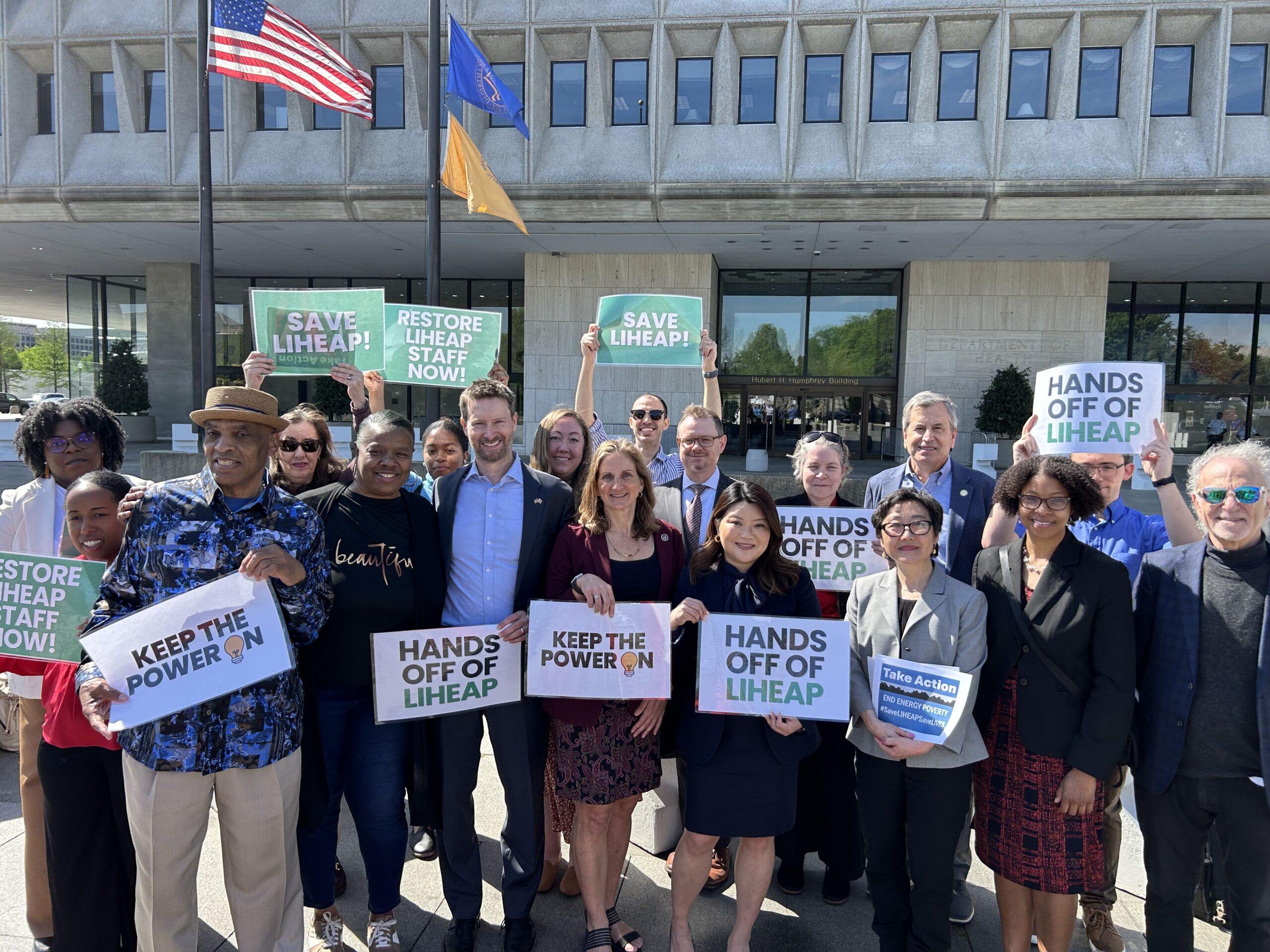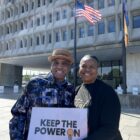
LIHEAP in Crisis: State Leaders, Advocates Warn HHS Cuts Put Low-Income Families at Risk of Utility Shutoffs and Health Emergencies
- Posted on
- By Kidest
- In Federal, Press Releases
Maryland, Virginia, and DC lawmakers highlight devastating impact of eliminating the Low-Income Home Energy Assistance Program (LIHEAP)
WASHINGTON, DC – A diverse coalition of elected officials, advocacy groups, and impacted residents held a press conference today outside of the U.S. Department of Health and Human Services (HHS) office in Washington, D.C., urging HHS to reverse drastic staff and funding cuts for the Low Income Home Energy Assistance Program (LIHEAP). The press conference, organized by regional state leaders including Delegate Lorig Charkoudian (MD District 20), drew attention to how this program serves as a lifeline for millions of low-income Americans who rely on energy assistance to survive extreme weather conditions.
On April 1, the entire federal staff responsible for administering LIHEAP was dismissed as part of a sweeping reduction at HHS. The abrupt termination of LIHEAP staff threatens the effective distribution of $4.1 billion in critical funding. LIHEAP alone serves approximately 6.7 million households annually, with 40% of them including senior citizens.
“As state legislators, we work hard to keep energy rates low and protect our most vulnerable residents,” said Delegate Charkoudian, MD District 20. “LIHEAP funding plays a critical role in keeping the heat and electricity on for seniors, veterans, medically fragile individuals, and others who would otherwise have to decide between an electric bill and groceries.”
“The elimination of LIHEAP would jeopardize vital utility assistance that prevents many low-income families, especially seniors, from having to choose between paying energy bills or buying food and medicine,” said Delegate Irene Shin, VA District 8. “If these federal staffing reductions were to become permanent or lead to broader program cuts, thousands of vulnerable households would face utility disconnections and increased financial hardship without adequate alternative safety nets in place.”
Advocates at the event warned that, without federal staff to process and distribute funds, low-income families across the country are at risk of utility shutoffs, debt, and health emergencies as summer heat intensifies and local agencies struggle to meet demand.
“I cannot express how much LIHEAP helps with BG&E bills. It makes my life just a little bit easier; without it, it would be a huge crisis,” said Jackie Wright, LIHEAP recipient.
“Having electricity or heat isn’t a luxury — it’s a necessity for everyone, regardless of their income,” said Dana Wiggins, Virginia Poverty Law Center.
The elimination of LIHEAP staff also raises concerns about the future of the program because there is a possibility that funds already allocated to the program will be withheld, and no funding will be allocated to the program in fiscal year 2026.
“LIHEAP saves lives, and it has helped keep home energy more affordable for over 40 years,” said Olivia Wein, senior attorney at the National Consumer Law Center. “It’s critical that HHS ensure there is no disruption to the administration of the LIHEAP program in order to protect families during future hot summers and cold winters.”
“It’s about health and safety — keeping the heat on in the winter for very low-income, mostly senior and disabled families,” said Laurel Peltier, Executive Director of Maryland Energy Advocates Coalition. “The Low-Income Heating Assistance Program financial grants are applied directly to our most vulnerable populations’ winter utility bill accounts to make the monthly bill more affordable.”
Immediately following the press conference, a bipartisan, regional legislator sign-on letter was delivered to key HHS staff, urging swift action to restore LIHEAP’s capacity. The letter currently has 92 legislators signed on.
“Creating safer, more energy-efficient homes is a critical part of ensuring that all Marylanders can stay in their homes longer, more comfortably, and with fewer risks to their health and wellness,” said Scott Gottbreht, Maryland Department of Housing and Community Development Assistant Secretary for Policy. “The Low Income Home Energy Assistance Program supports fundamental human dignity and safety in our communities, and cuts or delays would undermine the stability of working families and the well-being of children throughout the region.”
“We are very concerned about the continued delays by the Trump Administration in releasing the remaining $378 million in LIHEAP funds,” said Mark Wolfe, Executive Director, National Energy Assistance Directors Association. “These funds will help about 750,000 very poor families pay their cooling bills this summer and outstanding utility debt from this year’s cold winter. And if that wasn’t bad enough, the Administration’s draft budget would zero out LIHEAP, causing unnecessary harm to more than 6 million struggling families in every state of the country.”
“LIHEAP is a lifeline every year for around 15,000 District residents who fall behind on utility bills,” said Charles Allen, D.C. Councilman Ward 6. “When the air is shut off in the summer or the heat in the winter, it becomes very serious, very quickly – people die. This isn’t a red or blue state issue – it’s about making sure people on a fixed income don’t die of heat stroke. With the entire federal office overseeing the program terminated, I am extremely concerned about how money will get to the people who need it.”
Click HERE to watch the livestream recording.
Click on photos for full view.
# # #
This event was sponsored by: Members of the Maryland General Assembly, Members of the Virginia House of Delegates, Members of the DC City Council, Chesapeake Climate Action Network, Cancer Support Foundation, National Energy & Utility Affordability Coalition, VA Poverty Law Center, Maryland Energy Advocates Coalition, National Energy Assistance Directors Association, International Brotherhood of Electrical Workers 410, National Consumer Law Center, Maryland Department of Housing and Community Development, Maryland Office of People’s Counsel, International Brotherhood of Electric Workers Union 410 (IBEW410), International Brotherhood of Electric Workers Local Union 24 (IBEW 24)



